Unit 1 Where did you go on vacation? SectionB3a-self check写作课课件(20张PPT)
文档属性
| 名称 | Unit 1 Where did you go on vacation? SectionB3a-self check写作课课件(20张PPT) | 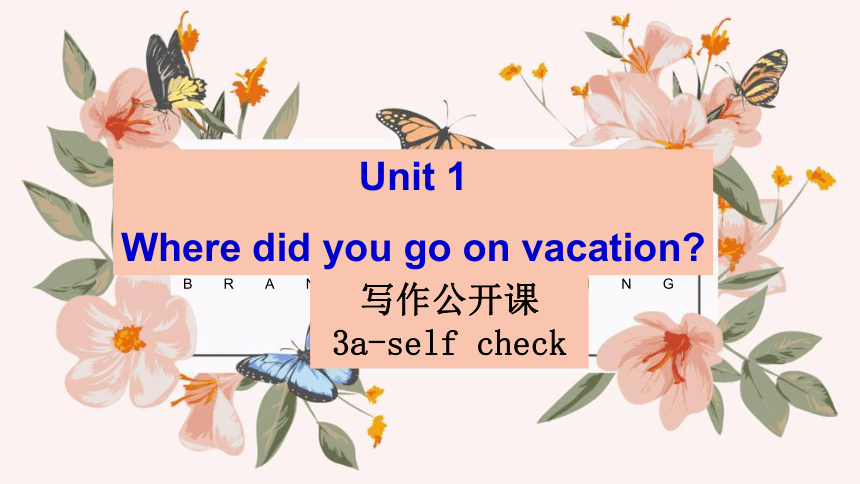 | |
| 格式 | pptx | ||
| 文件大小 | 14.3MB | ||
| 资源类型 | 教案 | ||
| 版本资源 | 人教新目标(Go for it)版 | ||
| 科目 | 英语 | ||
| 更新时间 | 2021-07-14 13:10:11 | ||
图片预览

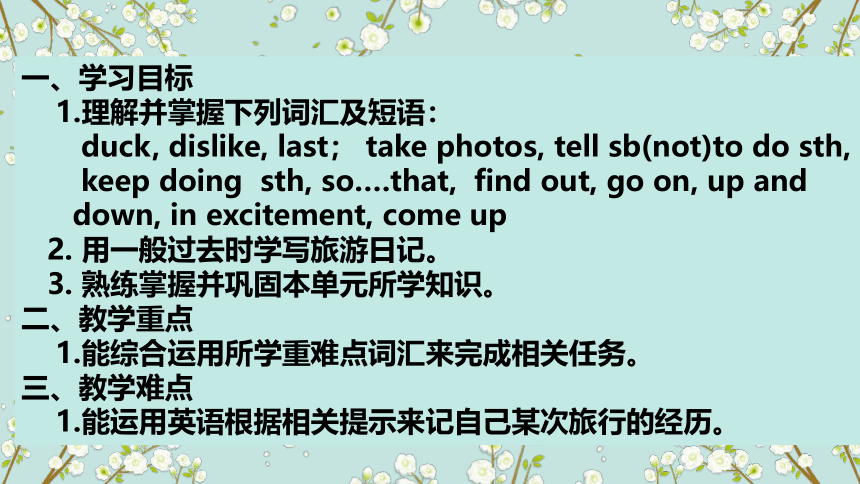


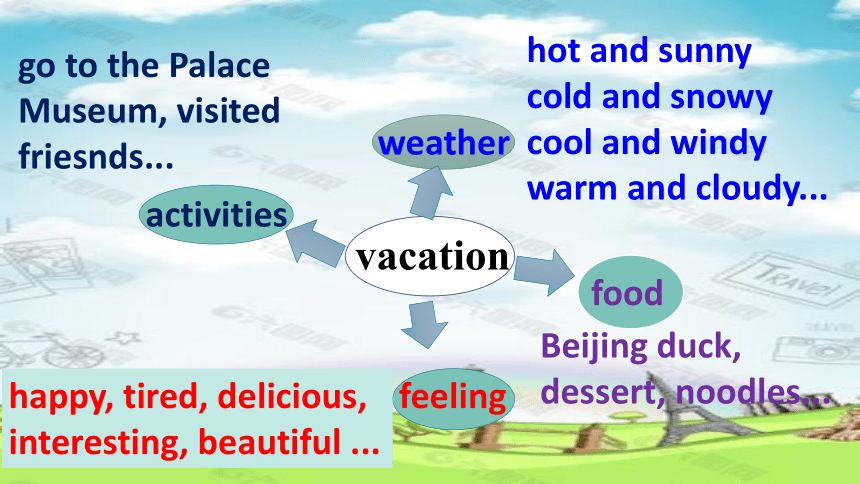
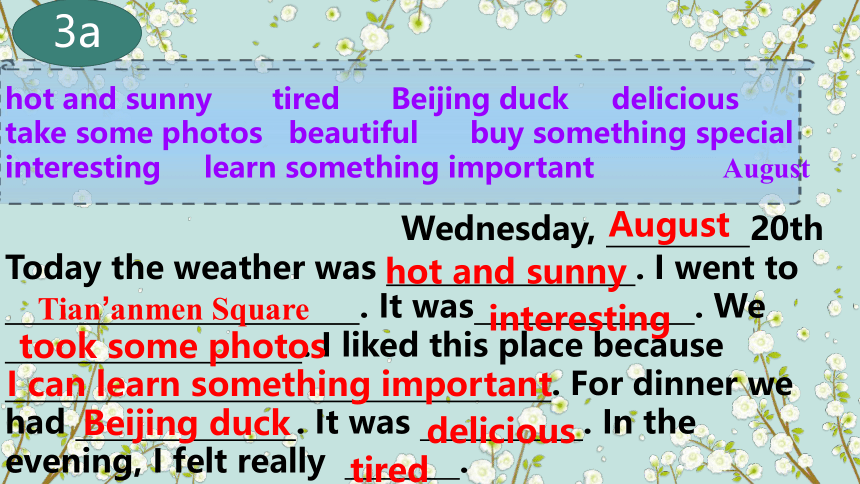
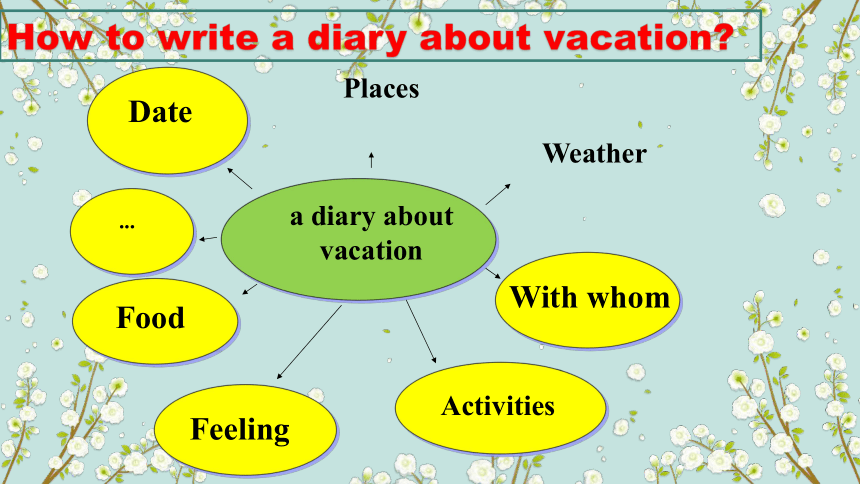
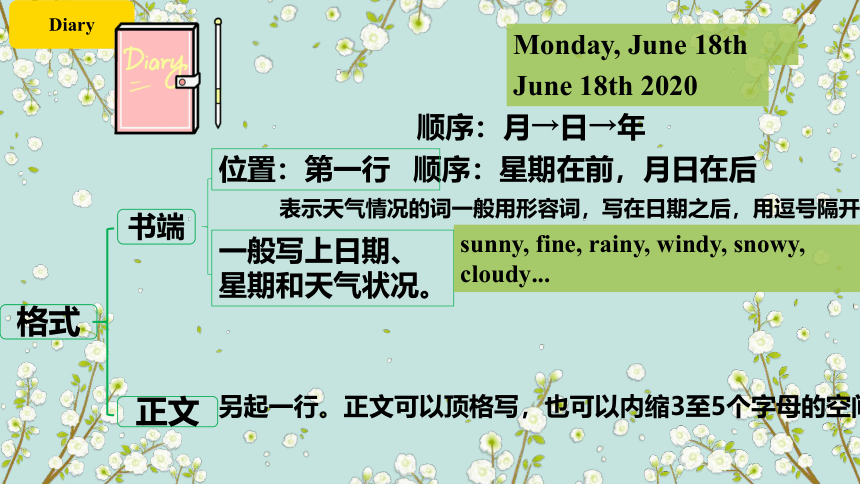
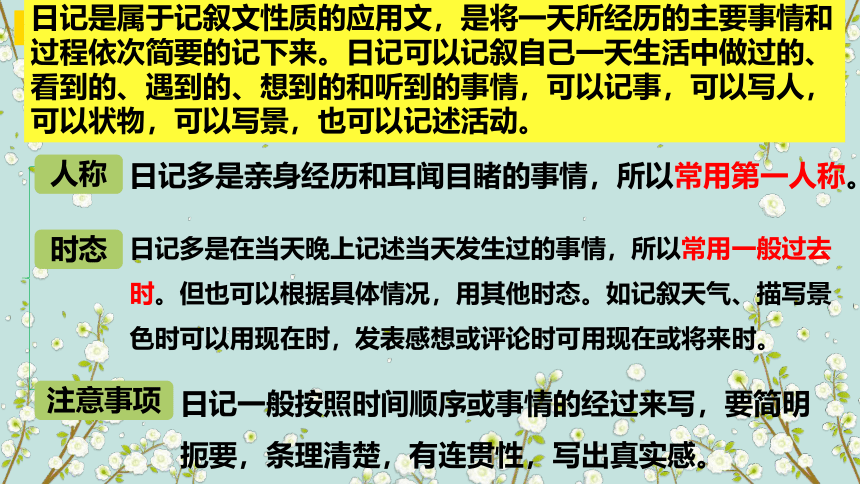
文档简介
BRAND PLANING
Unit 1
Where did you go on vacation?
写作公开课
3a-self check
一、学习目标
1.理解并掌握下列词汇及短语:
duck, dislike, last; take photos, tell sb(not)to do sth,
keep doing sth, so….that, find out, go on, up and
down, in excitement, come up
2. 用一般过去时学写旅游日记。
3. 熟练掌握并巩固本单元所学知识。
二、教学重点
1.能综合运用所学重难点词汇来完成相关任务。
三、教学难点
1.能运用英语根据相关提示来记自己某次旅行的经历。
Lead in:watch the vedio,then answer the following question.
What places of interest do you know in Beijing?
爆炸性新闻
Last summer vacation,I visited some places of interest in Beijing.
weather
food
vacation
activities
feeling
hot and sunny
cold and snowy
cool and windy
warm and cloudy...
Beijing duck, dessert, noodles...
happy, tired, delicious, interesting, beautiful ...
go to the Palace Museum, visited friesnds...
hot and sunny tired Beijing duck delicious take some photos beautiful buy something special interesting learn something important August
Wednesday, 20th
Today the weather was . I went to
. It was . We
. I liked this place because
. For dinner we had . It was . In the evening, I felt really .
3a
August
hot and sunny
Tian’anmen Square
interesting
took some photos
I can learn something important
Beijing duck
tired
delicious
How to write a diary about vacation?
a diary about vacation
Date
Weather
Places
With whom
Activities
Food
Feeling
...
Diary
另起一行。正文可以顶格写,也可以内缩3至5个字母的空间。
格式
表示天气情况的词一般用形容词,写在日期之后,用逗号隔开。
顺序:星期在前,月日在后
书端
正文
位置:第一行
一般写上日期、星期和天气状况。
顺序:月→日→年
June 18th 2020
sunny, fine, rainy, windy, snowy,
cloudy...
Monday, June 18th
日记多是在当天晚上记述当天发生过的事情,所以常用一般过去时。但也可以根据具体情况,用其他时态。如记叙天气、描写景色时可以用现在时,发表感想或评论时可用现在或将来时。
人称
日记多是亲身经历和耳闻目睹的事情,所以常用第一人称。
时态
日记一般按照时间顺序或事情的经过来写,要简明扼要,条理清楚,有连贯性,写出真实感。
注意事项
日记是属于记叙文性质的应用文,是将一天所经历的主要事情和过程依次简要的记下来。日记可以记叙自己一天生活中做过的、看到的、遇到的、想到的和听到的事情,可以记事,可以写人,可以状物,可以写景,也可以记述活动。
Hi, my name is Paul.
I went to Nanjing.
Hi, Paul. I’m Anna.
Where did you go on vacation?
Oh, I went to Beijing. Did you do anything special in Nanjing?
4.Imagine you are all foreigners on vacation in China. You meet each other at the airport on your way home. Talk about what you did on your vacation.
4
写作任务:
假如你和你的家人在四月八号这天参观了北京,请你以日记的形式把这天的经历及感受记录下来。
提示:1.?早上:参观颐和园(爬万寿山;在昆明湖划船)
2.?中午:吃北京烤鸭?
3.?下午:逛王府井大街
参考词汇:颐和园?the Summer Palace;万寿山?Longevity Hill;昆明湖Kunming Lake;王府井大街?Wangfujing Street;风景?scenery
小试身手
写作步骤:1. 定基调 体裁:应用文(日记),日记的主体部分为____。
时态:谈过去的经历时,用____________。
人称:写个人经历时,用______人称。 2. 列提纲、写句子
{5940675A-B579-460E-94D1-54222C63F5DA}列提纲
写句子
人物、旅行目的地及天气
(1) My family and I ___________________ (到达) Beijing early in the morning.(2) It _____________________ (晴朗).
旅行经历
早上
(3) We _________________________ (参观了颐和园).(4) We __________________ (爬万寿山) and _____________________________ (欣赏美丽的风景).(5) We ___________________________ (在昆明湖划船).
中午
(6) We ______________________ (吃了一些特色食物) like Beijing duck.(7) It _______________ (美味).
下午
(8) We _________________________ (去了王府井大街). (9) I ________________________ (买了一些有趣的东西) for my friends.
感受
(10) We ___________________________________ (过得很愉快).
3. 巧衔接写作的评分标准之一是文章是否连贯,因此想让文章连贯的方法之一就是学会恰当地使用一些衔接词。本文中,可用 in the morning (早上)、at noon (中午)、in the afternoon (下午) 表示事件发生的时间顺序;可用first (首先)、 after that (那之后)表示行程的先后顺序;可用 in a word (总之)来总结旅行的感受。4. 添佳句What delicious food it was!5. 成篇章 Saturday, April 8th______________________________________________________________________________
anything
everything
nothing
anyone
everyone
no one
someone
everybody
anybody
nobody
Self Check
1.不定代词当作单数使用,在句子中可作主语, 宾语,表语.
2.Some 构成的不定代词(somebody, something, someone)通常用在肯定句,一般不用在否定句和疑问句.但可以用在表示请求,建议的疑问句里,表示肯定的意思。
3.any构成的不定代词通常用于否定句和疑问句,也可用在条件句里。如果 any构成的不定代词用于肯定句,表示的是“任何人/物”
4.当使用形容词修饰不定代词时,形容词要放在不定代词之后。
How to use the indefinite pronouns :
1.Complete the conversations with the correct
words in the box.
anything
everything
nothing
anyone
everyone
no one
1. A: Did ________ go on vacation with you last month?
B: Yes, my family went to the countryside with me.
2. A: Did your family go to the beach with you last
weekend?
B: No. __________ from my family went, but my
friend went with me.
3. A: I didn’t bring back anything from Malaysia.
B: ___________ at all? Why not?
anyone
No one
Nothing
2.Complete the passage with the correct forms of
the verbs in brackets.
Last August, our class ______ (do) something very special on our school trip. We ______ (go) to Mount Tai. We ______ (start) our trip at 12:00 at night. Everyone in our class ______ (take) a bag with some food and water. After three hours, someone looked at the map and ______ (find) out we _______ (be,not) anywhere near the top. My legs ______ (be) so tired that I wanted to stop.
did
went
started
took
found
weren’t
were
1.so...that... 如此…以至于…so...that...引导结果状语从句,so后跟形容词或副词。
当that后的从句为肯定句时,可与enough...to...互换;
当that后的从句为否定句时,可与too...to...互换。
My classmates ______ (tell) me to keep going, so I ______ (go) on. At 5:00 a.m., we got to the top! Everyone ________ (jump) up and down in excitement. Twenty minutes later, the sun _______ (start) to come up. It was so beautiful that we _______ (forget) about the last five hours!
told
went
jumped
forgot
激动
2.tell sb. to do sth. 告诉某人做某事。
tell sb. to do sth.为固定结构,其否定形式为
tell sb. not to do sth.告诉某人不要做某事。
3.keep doing sth. 继续/重复做某事.指一直处于某种状态或持续某个动作。
Thank you for listening
bye
Unit 1
Where did you go on vacation?
写作公开课
3a-self check
一、学习目标
1.理解并掌握下列词汇及短语:
duck, dislike, last; take photos, tell sb(not)to do sth,
keep doing sth, so….that, find out, go on, up and
down, in excitement, come up
2. 用一般过去时学写旅游日记。
3. 熟练掌握并巩固本单元所学知识。
二、教学重点
1.能综合运用所学重难点词汇来完成相关任务。
三、教学难点
1.能运用英语根据相关提示来记自己某次旅行的经历。
Lead in:watch the vedio,then answer the following question.
What places of interest do you know in Beijing?
爆炸性新闻
Last summer vacation,I visited some places of interest in Beijing.
weather
food
vacation
activities
feeling
hot and sunny
cold and snowy
cool and windy
warm and cloudy...
Beijing duck, dessert, noodles...
happy, tired, delicious, interesting, beautiful ...
go to the Palace Museum, visited friesnds...
hot and sunny tired Beijing duck delicious take some photos beautiful buy something special interesting learn something important August
Wednesday, 20th
Today the weather was . I went to
. It was . We
. I liked this place because
. For dinner we had . It was . In the evening, I felt really .
3a
August
hot and sunny
Tian’anmen Square
interesting
took some photos
I can learn something important
Beijing duck
tired
delicious
How to write a diary about vacation?
a diary about vacation
Date
Weather
Places
With whom
Activities
Food
Feeling
...
Diary
另起一行。正文可以顶格写,也可以内缩3至5个字母的空间。
格式
表示天气情况的词一般用形容词,写在日期之后,用逗号隔开。
顺序:星期在前,月日在后
书端
正文
位置:第一行
一般写上日期、星期和天气状况。
顺序:月→日→年
June 18th 2020
sunny, fine, rainy, windy, snowy,
cloudy...
Monday, June 18th
日记多是在当天晚上记述当天发生过的事情,所以常用一般过去时。但也可以根据具体情况,用其他时态。如记叙天气、描写景色时可以用现在时,发表感想或评论时可用现在或将来时。
人称
日记多是亲身经历和耳闻目睹的事情,所以常用第一人称。
时态
日记一般按照时间顺序或事情的经过来写,要简明扼要,条理清楚,有连贯性,写出真实感。
注意事项
日记是属于记叙文性质的应用文,是将一天所经历的主要事情和过程依次简要的记下来。日记可以记叙自己一天生活中做过的、看到的、遇到的、想到的和听到的事情,可以记事,可以写人,可以状物,可以写景,也可以记述活动。
Hi, my name is Paul.
I went to Nanjing.
Hi, Paul. I’m Anna.
Where did you go on vacation?
Oh, I went to Beijing. Did you do anything special in Nanjing?
4.Imagine you are all foreigners on vacation in China. You meet each other at the airport on your way home. Talk about what you did on your vacation.
4
写作任务:
假如你和你的家人在四月八号这天参观了北京,请你以日记的形式把这天的经历及感受记录下来。
提示:1.?早上:参观颐和园(爬万寿山;在昆明湖划船)
2.?中午:吃北京烤鸭?
3.?下午:逛王府井大街
参考词汇:颐和园?the Summer Palace;万寿山?Longevity Hill;昆明湖Kunming Lake;王府井大街?Wangfujing Street;风景?scenery
小试身手
写作步骤:1. 定基调 体裁:应用文(日记),日记的主体部分为____。
时态:谈过去的经历时,用____________。
人称:写个人经历时,用______人称。 2. 列提纲、写句子
{5940675A-B579-460E-94D1-54222C63F5DA}列提纲
写句子
人物、旅行目的地及天气
(1) My family and I ___________________ (到达) Beijing early in the morning.(2) It _____________________ (晴朗).
旅行经历
早上
(3) We _________________________ (参观了颐和园).(4) We __________________ (爬万寿山) and _____________________________ (欣赏美丽的风景).(5) We ___________________________ (在昆明湖划船).
中午
(6) We ______________________ (吃了一些特色食物) like Beijing duck.(7) It _______________ (美味).
下午
(8) We _________________________ (去了王府井大街). (9) I ________________________ (买了一些有趣的东西) for my friends.
感受
(10) We ___________________________________ (过得很愉快).
3. 巧衔接写作的评分标准之一是文章是否连贯,因此想让文章连贯的方法之一就是学会恰当地使用一些衔接词。本文中,可用 in the morning (早上)、at noon (中午)、in the afternoon (下午) 表示事件发生的时间顺序;可用first (首先)、 after that (那之后)表示行程的先后顺序;可用 in a word (总之)来总结旅行的感受。4. 添佳句What delicious food it was!5. 成篇章 Saturday, April 8th______________________________________________________________________________
anything
everything
nothing
anyone
everyone
no one
someone
everybody
anybody
nobody
Self Check
1.不定代词当作单数使用,在句子中可作主语, 宾语,表语.
2.Some 构成的不定代词(somebody, something, someone)通常用在肯定句,一般不用在否定句和疑问句.但可以用在表示请求,建议的疑问句里,表示肯定的意思。
3.any构成的不定代词通常用于否定句和疑问句,也可用在条件句里。如果 any构成的不定代词用于肯定句,表示的是“任何人/物”
4.当使用形容词修饰不定代词时,形容词要放在不定代词之后。
How to use the indefinite pronouns :
1.Complete the conversations with the correct
words in the box.
anything
everything
nothing
anyone
everyone
no one
1. A: Did ________ go on vacation with you last month?
B: Yes, my family went to the countryside with me.
2. A: Did your family go to the beach with you last
weekend?
B: No. __________ from my family went, but my
friend went with me.
3. A: I didn’t bring back anything from Malaysia.
B: ___________ at all? Why not?
anyone
No one
Nothing
2.Complete the passage with the correct forms of
the verbs in brackets.
Last August, our class ______ (do) something very special on our school trip. We ______ (go) to Mount Tai. We ______ (start) our trip at 12:00 at night. Everyone in our class ______ (take) a bag with some food and water. After three hours, someone looked at the map and ______ (find) out we _______ (be,not) anywhere near the top. My legs ______ (be) so tired that I wanted to stop.
did
went
started
took
found
weren’t
were
1.so...that... 如此…以至于…so...that...引导结果状语从句,so后跟形容词或副词。
当that后的从句为肯定句时,可与enough...to...互换;
当that后的从句为否定句时,可与too...to...互换。
My classmates ______ (tell) me to keep going, so I ______ (go) on. At 5:00 a.m., we got to the top! Everyone ________ (jump) up and down in excitement. Twenty minutes later, the sun _______ (start) to come up. It was so beautiful that we _______ (forget) about the last five hours!
told
went
jumped
forgot
激动
2.tell sb. to do sth. 告诉某人做某事。
tell sb. to do sth.为固定结构,其否定形式为
tell sb. not to do sth.告诉某人不要做某事。
3.keep doing sth. 继续/重复做某事.指一直处于某种状态或持续某个动作。
Thank you for listening
bye
同课章节目录
- Unit 1 Where did you go on vacation?
- Section A
- Section B
- Unit 2 How often do you exercise?
- Section A
- Section B
- Unit 3 I'm more outgoing than my sister.
- Section A
- Section B
- Unit 4 What's the best movie theater?
- Section A
- Section B
- Unit 5 Do you want to watch a game show?
- Section A
- Section B
- Unit 6 I'm going to study computer science.
- Section A
- Section B
- Unit 7 Will people have robots?
- Section A
- Section B
- Unit 8 How do you make a banana milk shake?
- Section A
- Section B
- Unit 9 Can you come to my party?
- Section A
- Section B
- Unit 10 If you go to the party, you'll have a grea
- Section A
- Section B
